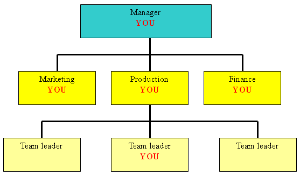Leadership - Structure
Structure
Organogram
When you become a leader and focus on strategy you will consider the structure of the team that you have.
Construct an organisational structure that is efficient for your activities.
Add in any current personnel and add yourself to all of the roles that you currently fill.
At first, you will be filling a lot of the roles. You will need to relinquish some of the responsibilities of these roles by delegation.
Notice you can only relinquish responsibility but not accountability.
Filling these roles and recruitment is tackled in a little more detail in ‘The Complete Project management package’.
You will also need to set clear goals etc which is covered in more detail in ‘The Complete Time management package’.
This technique can help put some flesh on the bones of your vision.
Role play
Most people feel they have an identity within the organisation that helps them cement their position in the system.
For example.
- You may be known to have a good memory for faces and person related facts. So, people come to you for information in this area.
- Computational skill and manipulation of data is your forte. You are called upon to assess information and assess trends and review data.
- Your communication skills are excellent and you become the spokesperson and presenter for key ideas.
- You have a great personality and people look to you for personnel coordination and team building.
- Your quick thinking and assessment of data makes you a prime choice at problem solving meetings.
In the same way you will have a key set of skills that make you the centre of attention in a particular area.
You may need to modify or give up that area through delegation. This is hard to do. It is not easy to relinquish responsibility for a skill that you might believe you are the best at.
If you have no time to consider strategy and vision you will have no time for the development of your time.
It is thus paramount that you make time to develop the vision and the development of your team.
If there is one area that will make people follow you it is seeing that you are willing to spend time on their development.
This builds the trust that you need in order to influence.
Succession
One of the reasons for delegation is succession planning.
What happens if you are absent for a long period or die, how would the team below you cope?
You need to assess your team on this basis.
If you feel that your team would not cope then why not?
Find the gaps in their skills and make sure these are filled.
Delegation is a key training method for succession.
The fact that others are being trained to step into your shoes does not make you redundant.
This is a fear that many people have. You will be motivating your staff and training them to move up or off to another position having added value to the organisation instead of just marking time.
Control
We have spoken about the balance of delegation the relinquishing of control instead of holding on to things.
It is important to analyse where the control is coming from.
Is it yourself or is it the organisation?
Is the control too much or too little?
Once you have identified areas of ‘too much’ control you need to do something about it.
You will need to modify an aspect of your behaviour to create change.
Don’t blame the organisation.
It may be that there are areas which you are unable to influence within the organisation but you should still think about what could be done and weigh up options.
Any changes that you propose should be communicated to interested parties within the organisation.
Strong leadership is based on your internal values.
Once you have shared and agreed the vision your ultimate control is setting up the correct climate for good delegation.
If you have well focussed goals and milestones you will require good criteria for making sure you know when these are met. This gives the person confidence and hence yourself confidence in the delegation procedure.
You are in absolute control when the organisation can function on a procedural level without you.
If a person already has the skills to allow you to delegate a task then do so. If not consider coaching and then specific training to allow future delegation.



